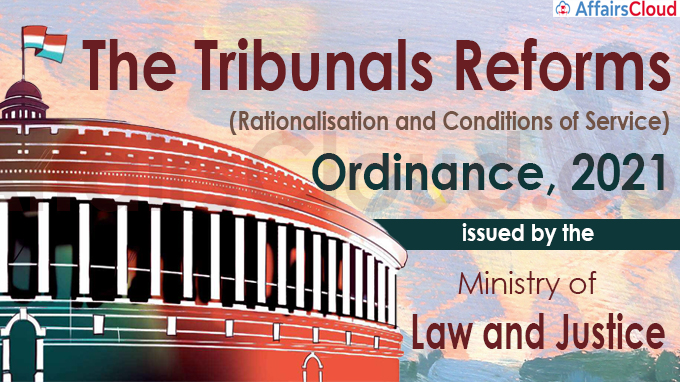
President Ram Nath Kovind promulgated ‘The Tribunals Reforms (Rationalisation and Conditions of Service) Ordinance, 2021’. The ordinance dissolves existing appellate authorities under 9 acts and transfers their functions (hearing appeals) to High Courts.
- The ordinance was issued by the Ministry of Law & Justice.
i.In Addition to the 9 laws, the Ordinance also amends Section 184 of the Finance Act 2017.
ii.The Nine Laws (Replacement of Appellate Authorities/Tribunals)
- Cinematograph Act, 1952
- Trade Marks Act, 1999
- Copyright Act, 1957
- Customs Act, 1962
- Patents Act, 1970
- Airports Authority of India Act, 1994
- Control of National Highways (Land and Traffic) Act, 2002
- Geographical Indications of Goods (Registration and Protection) Act, 1999
- Protection of Plant Varieties and Farmers’ Rights Act, 2001
The appellate body of 3 Acts will be replaced by subdivisions of High Court
- The Copyright Act, 1957 – Commercial Court or the Commercial Division of a High Court.
- The Airports Authority of India Act, 1994 – Central Government (disputes related to properties left on airport premises) & High Court (appeals against orders of an eviction officer).
- The Control of National Highways (Land and Traffic) Act, 2002 – Civil Court (Civil Court of original jurisdiction in a district, and includes the High Court in exercise of its ordinary original civil jurisdiction).
Amendment to Finance Act, 2017
Amendment to Finance Act 2017 introduced provisions related to the composition of Search-cum-selection committees and term of office of tribunal members in the Act itself.
Search-cum-Selection Committees
The ordinance proposes the following changes in the composition
- Chairperson (with voting right) – Chief Justice of India (CJI) or Supreme Court (SC) Judge nominated by CJI.
- 2 Secretaries nominated by the Central Government.
- Sitting or outgoing Chairperson – either retired SC Judge or retired Chief Justice of High Court)
- Secretary of the Ministry under which the Tribunal is constituted (no voting right)
Tenure
- The Tenure of Chairperson of a Tribunal has been fixed for a term of 4 years (or till the age of 70).
- Members of a Tribunal will have tenure of 4 years (or until they turn 67)
Fact
- Article 123 of Constitution deals with the Ordinance making power of the President
- An Ordinance is promulgated if both houses of the Parliament are not in session or circumstances occur where the President thinks it is necessary to act without waiting for houses to assemble.
Recent Related News:
i.On November 4, 2020, President Ram Nath Kovind promulgated the Arbitration and Conciliation (Amendment) Ordinance, 2020.
About Ministry of Law & Justice
Union Minister – Ravi Shankar Prasad (Lok Sabha – Patna Sahib, Bihar)




